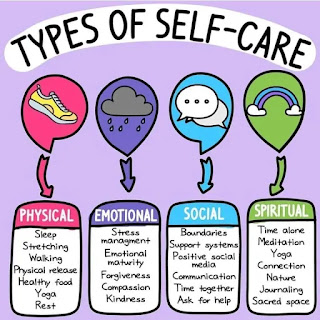The Need for Self-Care
Jennifer Morris, MD PC
APBN, ABOM, ABPM-addiction, ISSP
Despite knowledge of the benefits of self care, leaders are resistant to the idea (Palena Naele, Harvard Business Review, 10/22/20.) This resistance often stems from feeling self-care is a sign of weakness, feeling they don't have time, or dismissing the idea of self-care.
Self-care is more than new-age nonsense...and is in fact a critical part of serious leadership. It's more important now than ever; 91% of executives report experiencing a significant spike in workplace stress compared to pre-pandemic times, due to increasing workloads and added responsibilities (Anne Stych, The business Journals, 6/23/23.) (Rather than an indulgence, or luxury, self-care is something leaders cannot fare successfully without--long term.
The initial challenge to realizing the need for self-care, is an accurate conceptualization of what self-care is. We understand that our cars need regular tune-ups and maintenance to run properly, and that pushing our air-conditioners too hard in a heat-wave can cause them to burn out (ask anyone from south Texas north to the Kansas border.) Delay plugging in my laptop, and it will die (like, just now...) However, we often don't realize the same applies to our bodies and mental well-being.
A healthy diet is linked to better moods, higher energy levels, and lower levels of depression (that all to familiar low-inflammation diet.) Aerobic exercise boosts learning and memory. Good sleep is linked to increase focus, improved cognitive function, greater learning and improved empathy.
Time if a limited and often challenged resource. We are scheduled from awakening time to bedtime, and sometimes in-between. This stress taxes our brains, reducing efficiency of the frontal cortex. Why is that important? The frontal cortex is responsible for logical reasoning, problem-solving, decision making, and willpower. Taking breaks prevents decision fatigue, renews and strengthens motivation, increases productivity and creativity, consolidates memory and improves learning.
An example of amygdala-driven decision making occurred for me a few days ago, when I was taking my son to a new practice field. We were going to be "just in time", and then I took a wrong turn. Anxiety about the wrong turn and potential for being late created additional wrong turns, Siri chirping more and more confusing corrections, a frustrated and anxious and ultimately reactive-to-my-stress ten year old, and being 20 minutes rather than 2 minutes late for practice. Accepting the wrong turn, taking a deep breath, and resetting our path would have been much more efficient, less stressful, and ultimately healthier for the relationship I have with my son.
We can prioritize our time usage by determining what our key priorities are, and whether we can achieve them mindfully. A favorite analogy I grew up with was filling a jar with rocks. If you fill the jar first with sand, pebbles, then smaller and then larger rocks, one cannot place as many rocks in the jar. However, by starting with the bigger rocks first, then smaller rocks, then pebbles and then sand, much more will fit. Mindful usage of time increases efficiency AND well-being.
Are there things we could say no to and get back time (social media, going to Starbucks rather than making coffee at home, television?) Could this time be used for...self-care?
Some new to leadership may believe that strong leaders don't need self-care. However, as in my driving example before, self-care protects cognitive processes and therefore makes the individual...and by extension, the leader...more productive and efficient.
As an additional point...as leaders we are examples that others follow--for better or for worse. If we demonstrate that self care is both unnecessary and undesirable, and risks the entire organization following this course and becoming disorganized and chaotic.
- if a leader you admired was struggling with stress, what would you advise them to do? What would you think or consider about this?
- how has taking some time for yourself benefited you or your team in the past? What benefits did you see?
- if you didn't need help, but needed a breather, how would you accomplish this?
Food for thought on why leaders AND THEIR TEAMS benefit from leaders engaging in self-care. More on recommendations for how-to in a later post--stay tuned!












Comments
Post a Comment